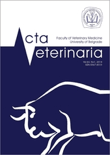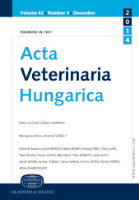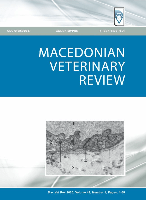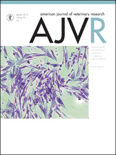
ACTA VETERINARIA-BEOGRAD
Scope & Guideline
Exploring the frontiers of veterinary science.
Introduction
Aims and Scopes
- Veterinary Surgery and Clinical Practice:
The journal publishes studies focusing on surgical techniques and clinical interventions in various animal species, highlighting innovative approaches such as advanced imaging techniques and novel surgical procedures. - Animal Health and Disease Management:
Research on the diagnosis, treatment, and prevention of diseases affecting domestic and wild animals is a core focus. This includes studies on infectious diseases, parasitology, and the impact of environmental factors on animal health. - Molecular and Genetic Studies:
The journal emphasizes the importance of molecular biology and genetics in veterinary science, including research on genetic markers, antimicrobial resistance, and pathogen characterization. - Nutrition and Metabolism in Veterinary Medicine:
Studies exploring the nutritional needs and metabolic processes of various animal species are featured, with an emphasis on dietary interventions and their effects on health and productivity. - Epidemiology and Public Health:
Research addressing the epidemiology of animal diseases and their implications for public health is prevalent, including studies on zoonotic diseases and the impact of climate change on disease distribution. - Comparative Medicine and Pathology:
The journal also includes comparative studies that enhance understanding of diseases across species, contributing to broader insights in both veterinary and human medicine.
Trending and Emerging
- Integrative and One Health Approaches:
There is a growing trend towards research that integrates animal health with human health and environmental considerations, aligning with the One Health concept. This includes studies on zoonotic diseases and their epidemiological implications. - Novel Diagnostic Techniques:
Emerging methodologies in diagnostics, particularly molecular and imaging technologies, are increasingly featured, showcasing advancements that enhance disease detection and management. - Nutritional Genomics:
Research at the intersection of nutrition and genetics is gaining prominence, focusing on how genetic factors influence dietary needs and responses in various animal species. - Antimicrobial Resistance and Stewardship:
With rising concerns over antibiotic resistance, studies exploring resistance profiles and alternative therapies are becoming more prevalent, reflecting a significant shift in veterinary pharmacology. - Animal Welfare and Behavioral Studies:
There is an increasing emphasis on animal welfare research, including studies on stress, behavior, and the impacts of husbandry practices on animal well-being. - Environmental Impact of Animal Production:
Research addressing the environmental consequences of animal production systems, including greenhouse gas emissions and sustainable practices, is emerging as a key area of interest.
Declining or Waning
- Traditional Livestock Management Practices:
Research focusing on conventional livestock management techniques has decreased, reflecting a shift towards more innovative and sustainable practices in animal husbandry. - Basic Parasitology Studies:
While parasitology remains a critical area, the focus on basic studies without innovative methodologies or applications has diminished, as researchers aim for more integrated and applied approaches. - Invasive Surgical Techniques:
There appears to be a decline in the publication of studies related to invasive surgical techniques, likely due to a growing preference for minimally invasive methods and advancements in veterinary technology. - Single-Species Studies:
Research concentrated solely on individual species without comparative or broader ecological context is less frequently published, as interdisciplinary and comparative studies gain traction. - Historical Veterinary Practices:
Papers focusing on historical perspectives or practices in veterinary medicine have become less common, as the journal pivots towards contemporary issues and cutting-edge research.
Similar Journals

JAPANESE JOURNAL OF VETERINARY RESEARCH
Championing rigorous research for global veterinary excellence.The Japanese Journal of Veterinary Research, published by Hokkaido University, is a pivotal resource in the field of veterinary science, focusing on a wide array of topics that contribute to the advancement of veterinary research. Established in 1965, this esteemed journal has been at the forefront of disseminating innovative research findings and methodologies crucial for animal health and welfare in Japan and beyond. With an ISSN of 0047-1917 and recognized in the Q3 quartile of veterinary journals, it serves as a significant platform for both established researchers and emerging scholars, fostering a collaborative environment that aims to elevate veterinary practice. Although it operates under a traditional subscription model without open access, the journal's selectivity and rigorous peer-review process enhance the quality of published works, attracting attention from global audiences. Based in Sapporo, Japan, the journal continually strives to provide a vital forum for discussions that shape the future of the veterinary profession.

Brazilian Journal of Hygiene and Animal Sanity
Advancing animal health for a safer tomorrow.Brazilian Journal of Hygiene and Animal Sanity is an esteemed academic publication dedicated to advancing the fields of veterinary science, animal health, and public health in Brazil and beyond. Published by UNIV FEDERAL CEARA, CENTRO CIENCIAS AGRARIAS, this journal serves as a vital resource for researchers, professionals, and students, providing peer-reviewed articles that explore critical issues related to hygiene practices, disease prevention, and animal welfare. With an ISSN of 1981-2965, the journal prioritizes the dissemination of innovative research findings and methodologies, aiming to impact the quality of life for both animals and humans significantly. Although currently not an Open Access journal, it continues to seek partnerships that will enhance its reach and accessibility. Situated in Fortaleza, Brazil, the journal is poised to become a cornerstone for those engaged in the study and improvement of zoonotic diseases and sanitation practices, reflecting the essential intersection of animal health and public wellbeing.

CANADIAN JOURNAL OF VETERINARY RESEARCH-REVUE CANADIENNE DE RECHERCHE VETERINAIRE
Advancing Veterinary Science for a Healthier TomorrowCanadian Journal of Veterinary Research - Revue Canadienne de Recherche Vétérinaire is a leading publication in the veterinary science community, published by the Canadian Veterinary Medical Association. Established in 1986, the journal serves as a crucial resource for researchers and practitioners alike, covering a broad spectrum of topics pertinent to veterinary medicine and animal health. With a current impact factor placing it in Q2 in the Veterinary (miscellaneous) category, it holds a rank of #85 out of 194 in Scopus for general veterinary research, demonstrating its influence and importance within the field. While the journal is not open access, it remains committed to the dissemination of high-quality research that fosters advancements in veterinary practice and education. Based in Ottawa, Canada, it strives to connect the international community of veterinary researchers and professionals through rigorous peer-reviewed articles that advance knowledge and methodologies in veterinary science.

Kleintierpraxis
Exploring the complexities of small animal health.Kleintierpraxis is a prominent journal dedicated to the field of small animal veterinary science, published by M H SCHAPER GMBH CO KG in Germany. With an ISSN of 0023-2076, the journal aims to disseminate cutting-edge research, clinical findings, and advancements in veterinary practices affecting small animals. Although it is categorized within the Q4 quartile for Small Animals in 2023 and holds a Scopus rank of 20 out of 20, its role in providing valuable insights to practitioners, researchers, and students in veterinary medicine cannot be underestimated. The journal covers a wide range of topics pertinent to veterinary care, diagnostics, and treatment methodologies, offering an essential resource for understanding the complexities of small animal health. While currently not open access, Kleintierpraxis continues to be a vital contribution to the veterinary literature landscape from 1996 through 2024, fostering professional development and knowledge within the community.

Indian Journal of Animal Research
Advancing Animal Science Through Innovative ResearchIndian Journal of Animal Research is a prominent publication in the field of animal science and veterinary medicine, established to advance the understanding of animal husbandry, biology, and health. Published by the AGRICULTURAL RESEARCH COMMUNICATION CENTRE, this journal has been contributing to the scholarly discourse since 2008, with a commitment to high-quality research dissemination. With its current Q3 ranking in both Animal Science and Zoology and Veterinary (miscellaneous) categories, it serves as a crucial platform for researchers aiming to share insights and innovations within these disciplines. Although it operates without open access, it remains widely recognized, fostering a collaborative academic environment. The journal's impact is underscored by its presence within the Scopus database, providing valuable rankings in both General Veterinary and Animal Science and Zoology fields. Researchers, professionals, and students interested in veterinary advancements and animal research will find this journal a valuable resource for the latest scientific findings and discussions. Join the community of scholars igniting progress in the vital realm of animal research.

ACTA VETERINARIA HUNGARICA
Connecting researchers to enhance veterinary excellence.ACTA VETERINARIA HUNGARICA is a prestigious academic journal published by AKADEMIAI KIADO ZRT, dedicated to the diverse field of veterinary science. With a history spanning over three decades since its inception in 1983, this journal provides a platform for the dissemination of high-quality research, clinical studies, and reviews that contribute to advancing knowledge in veterinary medicine and animal health. Based in Hungary, it has built a respectable reputation, reflected in its Scopus ranking, where it occupies the 84th position out of 194 in the General Veterinary category, placing it within the 56th percentile. Although the journal is not open access, it continues to attract a global audience of researchers, professionals, and students who are keen on exploring advancements in veterinary science as it converges towards its upcoming year of 2024. Readers will find valuable insights that foster innovation and improve animal care practices across various settings, making ACTA VETERINARIA HUNGARICA an essential resource for anyone involved in the veterinary field.

Macedonian Veterinary Review
Connecting researchers to elevate veterinary practices.Macedonian Veterinary Review is a prominent open access journal dedicated to advancing the field of veterinary science. Published by SCIENDO, this journal provides a crucial platform for researchers, professionals, and students to share their findings and insights related to veterinary practices, animal health, and welfare. Established with the aim of fostering knowledge exchange since its inception in 2010, the journal has made significant strides, evidenced by its 2023 Scopus ranking of #131 out of 194 in the General Veterinary category, placing it in the 32nd percentile among its peers. The journal's open access model enhances the dissemination of knowledge, ensuring that vital research reaches a wider audience, thereby addressing key issues in the veterinary landscape. With its base in Macedonia and a commitment to high-quality scholarly contributions, the Macedonian Veterinary Review is an essential resource for anyone involved in veterinary research and practice, reflecting the ongoing developments and challenges in this critical field.

Exploratory Animal and Medical Research
Advancing veterinary science through open collaboration.Exploratory Animal and Medical Research is a vital platform for progressive research in the fields of veterinary medicine, ecology, and public health, published by the West Bengal Veterinary Association. Since its inception in 2011 as an Open Access journal, it has enabled the dissemination of critical knowledge without barriers, thereby fostering innovation and collaboration among researchers globally. With an ISSN of 2277-470X and an E-ISSN of 2319-247X, the journal has gained significant traction, as reflected in its Scopus ranking, where it stands at Rank #110/194 for Veterinary General Veterinary and Rank #242/398 in Medicine (miscellaneous), highlighting its relevance in the scientific community. The journal covers a wide scope that includes veterinary medicine, health, toxicology, and environmental studies, having earned category quartiles in 2023 that range from Q3 to Q4 across multiple disciplines. Based in India, it serves as an essential conduit for the latest research findings, making a considerable impact on both local and global scales.

EGYPTIAN JOURNAL OF VETERINARY SCIENCE
Connecting researchers to enhance veterinary practices.Welcome to the Egyptian Journal of Veterinary Science, a pivotal publication dedicated to advancing the field of veterinary science, particularly within the unique context of Egypt and the surrounding regions. Published by the Natl Information Documentation Centre, this journal has been a key scholarly resource since its inception in 1977, focusing on diverse aspects of veterinary medicine, including animal health, nutrition, and management practices. With an impressive editorial commitment and a wide scope covering animal science, equine studies, food animals, and small animal veterinary practice, the journal stands as a critical platform for researchers and professionals alike. While currently categorized in Q4 for Animal Science and Zoology, and achieving Q3 rankings in several other veterinary subfields, it serves as a vital avenue for disseminating innovative research and practical insights. Access to the latest findings and case studies aims to foster improved veterinary practices and enhance animal welfare standards. As we navigate the complexities of veterinary science, the Egyptian Journal of Veterinary Science remains an essential tool for those committed to the health and welfare of animals across various disciplines.

AMERICAN JOURNAL OF VETERINARY RESEARCH
Elevating Animal Welfare Through Scholarly ContributionsAmerican Journal of Veterinary Research, published by the American Veterinary Medical Association, serves as a cornerstone of the veterinary medical community, providing essential insights from 1945 to the present. With an ISSN of 0002-9645 and E-ISSN of 1943-5681, this esteemed journal focuses on a diverse range of topics within the veterinary field, contributing to the advancement of veterinary science through rigorous peer-reviewed research. Ranking in the Q2 category in Veterinary (miscellaneous) and Q3 in Medicine (miscellaneous) category as of 2023, it holds a respectable position in Scopus rankings, further emphasizing its impact in the field. While currently not an Open Access journal, its objective remains clear: to disseminate cutting-edge research that informs clinical practice and enhances animal health and welfare. The American Journal of Veterinary Research is invaluable for researchers, professionals, and students seeking to stay at the forefront of veterinary advancements and innovations.